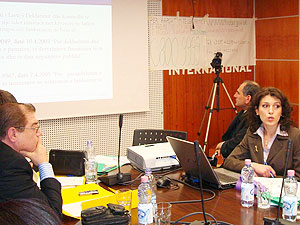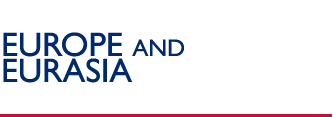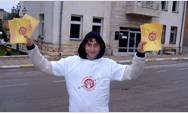Officials Fined, Dismissed on Corruption Charges
 |
| In a January 2009 news conference in Vlora, Fjorida Kallo, Director of HIDAAs Legal Department presented new procedures requiring children of public officials to declare their assets. Supported by USAID’s Rule of Law program, HIDAA hopes to increase the role of Albanias media and civil society organizations to investigate conflicts of interests and corrupt practices of government officials. |
In 2008, the Chief Prosecutor in Albania’s port city of Durres resigned after an investigation uncovered nearly €800,000 of hidden and unjustified assets. In the following weeks, extensive media coverage was given to cases involving three more officials working in the Government’s tax, customs, and public broadcasting agencies, all sued for lying on declaration of asset forms. Headlines of local newspapers reprinted a new order that children of high officials in Albania will now have to declare their assets.
At the center of these stories is a unique government agency, the High Inspectorate for the Disclosure and Audit of Assets (HIDAA), created by legislation recommended by a USAID-backed NGO coalition in 2003 to assist in reducing corruption in Albania’s public sector.
HIDAA audits all public officials on two-year intervals. Its mandate was expanded in 2005 to include the implementation of a conflict of interest law, also drafted with U.S. assistance.
Every year, HIDAA receives approximately 4,000 declaration forms. Through thorough investigations, it resolves, on average, 100 conflict of interest cases each year with officials being dismissed, fined, or forced to resolve the conflict. With these numbers, officials in Albania and governments in the region are taking notice. Representatives from Macedonia, Kosovo, Montenegro, Latvia, Lithuania and Romania have all sponsored trips to Albania to see how they can replicate the success of HIDAA in their own countries.
HIDAA’s success as an agency, however, was not always so certain. In its first year, it had a budget of just over $40,000 and was located in a dilapidated building that required extensive reconstruction and renovation efforts. Early U.S. assistance in the form of donations of computers and office equipment provided their small staff of only 30 personnel the basics to begin work.
Today, with an annual state budget of over $800,000, HIDAA has over 500 representative authorities working in central and local institutions across the country. From a fledgling agency with an uncertain future, the 2008 Nations in Transit report recognized HIDAA’s progress, considering it as a highly respected and influential institution with an essential role in the government’s anti-corruption efforts.
Yet, with HIDAA’s success, the fight against corruption in Albania is far from over. As noted by USAID’s Rule of Law Advisor, Elina Koci, “Officials are complying with their requirements; there is a high filing rate but there is also the issue of hiding assets.” HIDAA must become more competent in gathering data, says Koci. The policy requiring children of officials to declare their assets is the latest effort by the agency to close this increasingly used loophole. According to Koci, who has worked with the HIDAA since its inception, HIDAA’s mandate is limited and requires cooperation with the media, civil society, financial institutions, and most importantly, prosecutors.
“Because HIDAA’s enforcement capabilities, by law, do not go beyond putting fines for those officials who do not file or when it comes to the hiding of assets, it is the cooperation with the prosecutors that turns HIDAA’s investigations into success or failure.” While few cases from HIDAA have been successfully prosecuted, pressure from the media on prosecution has grown and recent cases are thought to be substantial enough to merit full-fledged trials.
There is little doubt that these and other cases from HIDAA will continue to generate interest in the media, general public, and among officials. In a room packed with journalists and civil society representatives this month, HIDAA announced more new filing procedures for public disclosures—one of many sure signs that this agency is helping create a new culture of transparency in Albania based on standards of accountability and honesty of its public officials.
Back to Top ^ |


